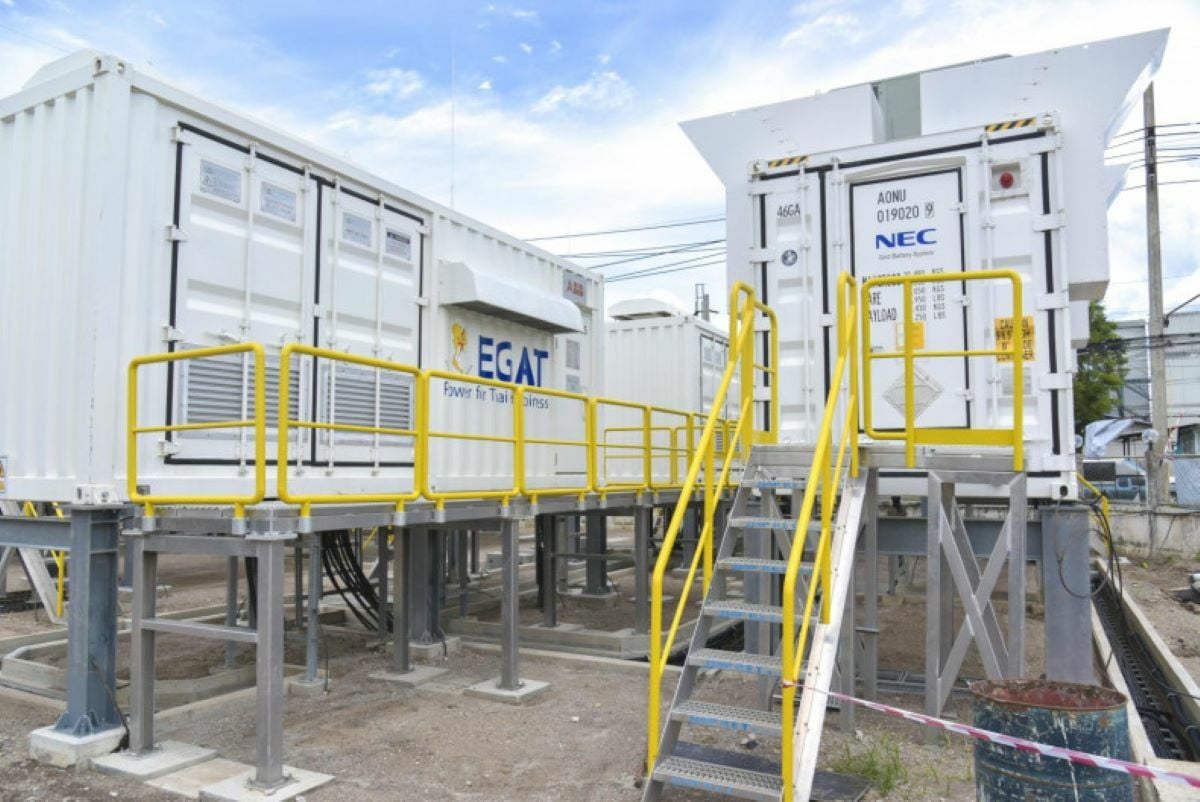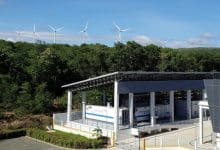Thailand’s renewable energy plan boosts battery storage systems

Electric vehicles (EVs) are widely known for their battery power but batteries are also crucial for buildings, factories, and power plants using renewable energy. They provide lighting, support daily operations, and serve as backup electricity sources.
Battery energy storage systems (BESS) are essential for buildings and renewable power generation facilities to ensure uninterrupted electricity supply. Renewable sources like solar and wind power are intermittent, and influenced by weather patterns. BESS mitigates this issue by storing electricity for future use.
Thailand’s 2024 power development plan (PDP) aims to increase renewable energy use, highlighting the importance of BESS alongside solar panels and wind turbines. This could create new business opportunities for entrepreneurs if prices decrease or new technologies emerge for stationary batteries.
Somchai Homklinkaew, from the Metropolitan Electricity Authority, emphasised the importance of BESS for maintaining power stability as the country increases its reliance on renewable energy.
“BESS plays a key role in supporting the continual supply of electricity and will be essential for state efforts to achieve carbon neutrality.”
Thailand is committed to reducing carbon dioxide emissions, with the government aiming for carbon neutrality by 2050, as announced at the 2021 UN Climate Change Conference in Glasgow.
Continuous clean power
The Electricity Generating Authority of Thailand (EGAT) is increasing its renewable energy supply to meet this goal, using BESS to support clean power transmission at substations in Chaiyaphum and Lop Buri provinces. These substations use lithium-ion batteries to ensure a continuous supply of clean power by storing electricity during low demand and releasing it during peak times.
As EGAT and other power firms expand their renewable power generation capacity, the role of BESS will grow, aligning with the government’s plan to reduce dependence on fossil fuel-fired power plants. The PDP outlines an increase in renewable energy’s share to 51% of total power generation by 2037, up from 20% last year. Coal and gas are expected to account for 48%, with the remaining 1% from nuclear energy and new solutions aimed at reducing fossil fuel usage.
Investment in renewable energy between 2024 and 2030 is estimated at 525 billion baht, with an additional electricity generation capacity of 13.3 megawatts. Most of this renewable power will come from solar energy, followed by wind, biomass, biogas, floating solar panels, waste-to-energy projects, mini-hydropower plants, geothermal power, and imported renewable electricity from neighbouring countries.
Watcharin Boonyarit, director of solar energy development at the Department of Alternative Energy Development and Efficiency, noted the potential for BESS to create business opportunities as Thailand transitions to renewable power sources.
“We should not only import BESS but also consider new investment projects in this battery business.”
The government’s policy to develop the EV industry includes incentive packages to promote EV and battery manufacturing. Watcharin suggested that these incentives could be extended to stationary battery production for buildings. He also mentioned that BESS should complement the state policy promoting solar energy, benefiting companies producing rooftop solar panels.
Price drops
Suttichai Premrudeepreechacharn from Chiang Mai University’s Faculty of Engineering highlighted the expected drop in BESS production costs, which could fall below US$100 per kilowatt-hour from the current nearly US$200 per kilowatt-hour. This cost reduction, along with increasing rooftop solar panel purchases, should boost BESS sales, with homeowners becoming new customers alongside renewable power operators.
The Federation of Thai Industries’ Renewable Energy Industry Club sees potential in sodium-ion battery (SIB) production as an alternative to lithium-ion batteries. SIBs, made from rock salt, could offer a new business opportunity given Thailand’s abundant rock salt reserves.
Veeradej Tejapaibul, the vice-chairman of the club, suggested that government support for rock salt exploration could attract investment in SIB manufacturing.
Many countries are developing SIB pilot projects, and if production scales commercially, Thai officials should create investment incentives for domestic BESS manufacturing based on SIB technology. Veeradej noted that SIBs, with their faster charging times, higher stability, and environmental benefits, could be suitable for buildings due to their megawatt-level capacity, despite their lower energy density compared to lithium-ion batteries.
BESS may currently be less popular than EV batteries, but demand is expected to rise significantly in the next three to four years as households increasingly rely on renewable energy, reported Bangkok Post.
Latest Thailand News
Follow The Thaiger on Google News:


























